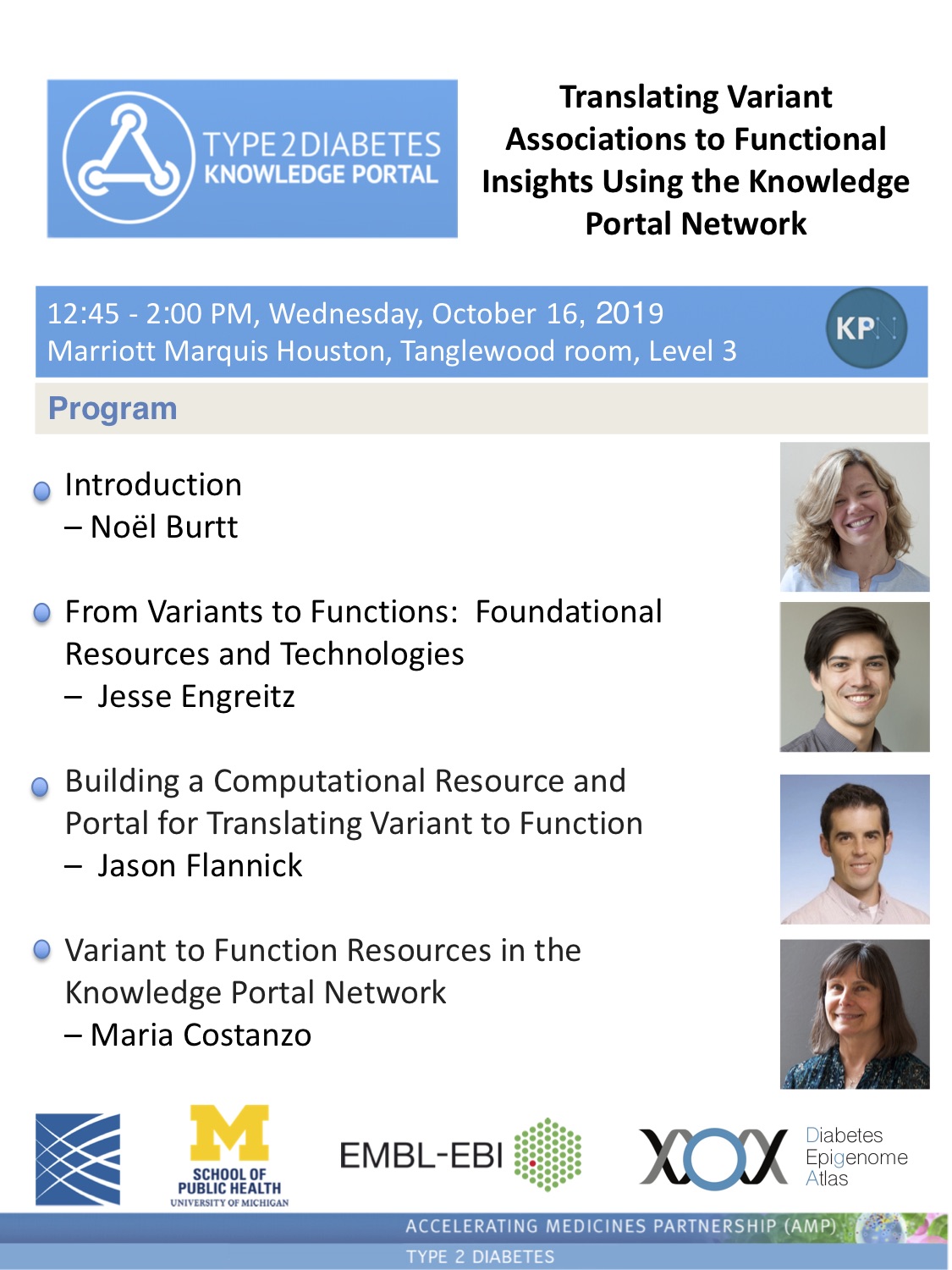On the eve of the American Society of Human Genetics meeting in Houston, TX, we are pleased to announce several improvements to the Accelerating Medicines Partnership Type 2 Diabetes Knowledge Portal (T2DKP). Today’s release includes large new datasets; a set of publicly available APIs for programmatic access to summary statistics in the T2DKP; additional custom aggregation tests for computing gene-level association scores; a beta version of an interface presenting computational results to help prioritize variants in a locus; and a clean new design for the Portal home page and menus.
New Datasets
Datasets newly incorporated into the T2DKP include:
- TOPMed HbA1c Meta-analysis WGS, from a newly-published study (Sarnowski et al., 2019), is a trans-ethnic meta-analysis of HbA1c associations in over 10,000 whole-genome sequence samples from the NHLBI Trans-Omics for Precision Medicine (TOPMed) consortium.
- Joint T2D-CHD GWAS (Zhao et al., 2017), is a trans-ethnic analysis of genetic associations for T2D risk followed by testing of significant T2D-associated variants for association with coronary artery disease, in over 526,000 subjects.
- UK Biobank Cardiometabolic Consortium CHD GWAS, with nearly 340,000 samples, is a meta-analysis of coronary artery disease genetic associations (Nelson et al., 2017). This study analyzed associations with a "SOFT CAD" phenotype, which includes chronic ischemic heart disease and angina in addition to the "HARD CAD" phenotypes (fatal or nonfatal myocardial infarction, percutaneous transluminal coronary angioplasty, and coronary artery bypass grafting). Note that the CARDIoGRAMplusC4D GWAS dataset previously in the T2DKP represents a subset of this set.
- We have updated the CKDGen GWAS datasets from the Chronic Kidney Disease Genetics Consortium with the results from two new papers: Wuttke et al., 2019, and Teumer et al., 2019. CKDGen results in the T2DKP are now grouped into 4 datasets: "CKDGen GWAS", with blood urea nitrogen, chronic kidney disease, and eGFR (serum creatinine) associations from more than 765,000 samples; "CKDGen GWAS - microalbuminuria associations", with microalbuminuria associations from over 347,000 samples; "CKDGen GWAS - stratified UACR associations", with urinary albumin-to-creatinine ratio associations from more than 564,000 samples, with sub-cohorts of African American and European ancestry and type 2 diabetics; and "CKDGen 1000G GWAS - eGFRcys associations, with associations from over 20,000 subjects for estimated glomerular filtration rate based on serum cystatin.
API access to genetic association and computational results
The T2DKP has developed into a data and software platform that is now seen as a model for democratizing access to genetic data and facilitating worldwide research. To further this goal, in addition to presenting genetic association results to researchers via the T2DKP website, we are developing software (APIs) that allow T2DKP users to query summary statistics programmatically. We will work to ensure that these APIs are compliant with the FAIR principles and with the standards of the Global Alliance for Genomics and Health. Currently available APIs are listed on our new “APIs” page, which may be accessed from the “Data” pull-down menu in the upper menu bar:

APIs are available for query of:
- summary genetic associations in specific genomic regions;
- results from computational methods run across all of the T2DKP datasets (DEPICT, eCAVIAR, LDSR, MAGMA, GREGOR, and METAL);
- and results that have been downloaded from GTEx and the Mouse Genome Informatics (MGI) database.
The APIs allow queries of all the genetic association summary statistics that are currently incorporated into the T2DKP (listed on the Datasets page) but do not access individual-level data. For datasets where the summary statistics were not already freely available for public download, we obtained permission from the authors for API access to the results. Programmatic access to the results poses no greater a privacy risk than displaying them on the T2DKP website, and we are confident that this risk is negligible, as detailed in our white paper on privacy risks in the Knowledge Portal platform.
More custom aggregation test methods now available
Custom aggregation tests in the T2DKP allow you to securely access individual-level association data and generate gene-level genetic association scores for a range of phenotypes. Previously, the T2DKP offered only one method, the additive burden test. Now, in collaboration with our colleagues at the University of Michigan, we have added four methods: the Collapsing burden test, SKAT, SKAT-O, and the Variable threshold burden test. These methods are described in our Aggregation test documentation. And check out our new tutorial video for an overview of the aggregation tests.
Beta version of the Variant FOCUS table ready for testing
Identifying the gene products that are directly involved in disease processes is essential for a better understanding of disease risk and progression. But it is rarely straightforward to make these identifications from variant genetic associations. To help researchers make the connection between risk-associated variants and disease genes, we are assembling a toolkit of cutting-edge computational methods and applying them to all of the genetic association data in the T2DKP. The methods integrate GWAS data with transcriptomic data, tissue-specific gene expression results, eQTL data, and more to predict the probability of associations between variants, genes, phenotypes, and tissues. We present these results in interactive FOCUS (Find Orthogonal Computational Support) tables.
This release includes an in-development beta version of the Variant FOCUS table, which allows you to specify a genomic region and a phenotype, calculates posterior probabilities for the 10 variants in that region with the strongest associations for that phenotype, and then displays epigenetic information to help you evaluate the importance of the variants in the set. The interface presents GREGOR results to guide the selection of epigenetic annotations to evaluate.
Please test this beta version of the Variant FOCUS table and let us know what you think!
New T2DKP design
We've updated the T2DKP with a clean new look for faster page loading and more straightforward navigation. New pull-down menus from the upper menu bar now facilitate easy access to internal pages.
See you at ASHG!
Don't miss our ancillary session on Foundational Resources for Translating Genetic Associations to Function and Targets, and come meet us in the exhibit hall at booth #131!

